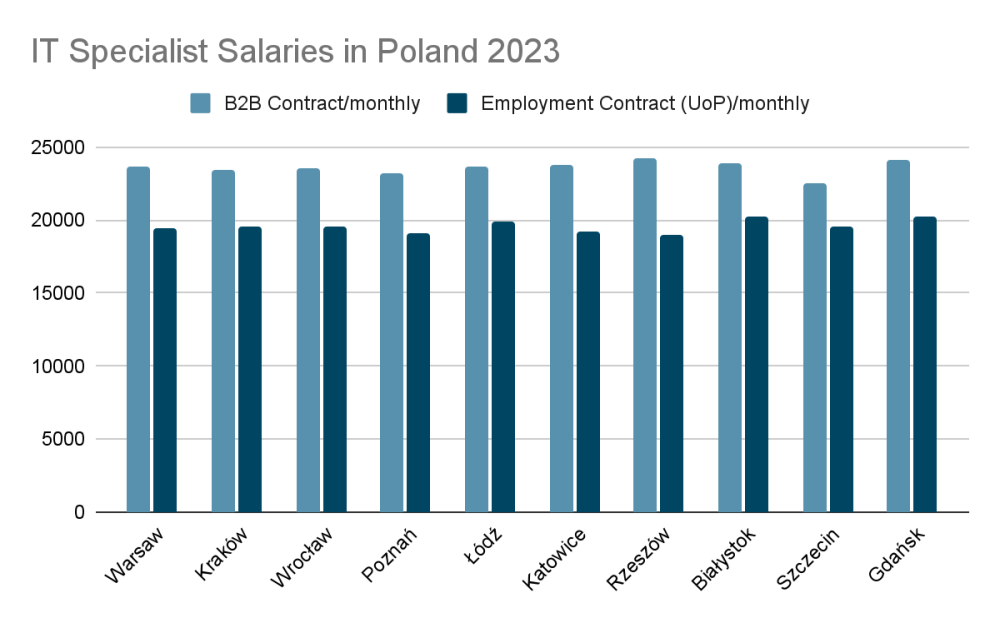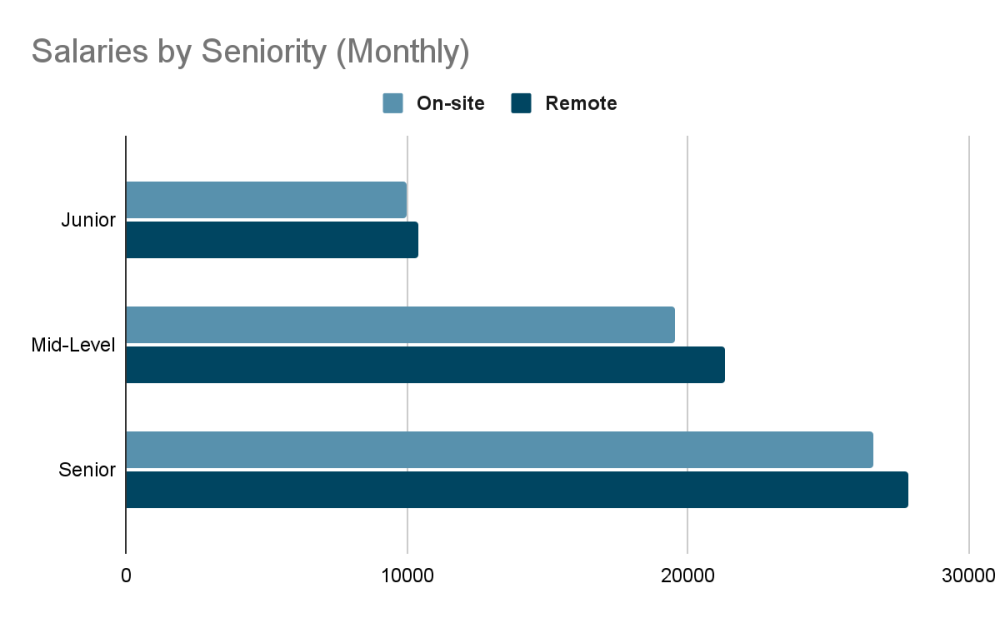General characteristics of the labor market for IT specialists in Poland:
Poland is actively transforming its economic structure, focusing on digitization and innovation. Thanks to its strategic position in the heart of Europe, a high level of education among the population, and investments in the IT sector, Poland has emerged as one of the leading IT hubs in the region. This has led to an increased demand for IT specialists, driven by the growth of startups, the expansion of international tech companies in the country, and increased government investments in digital projects. As a result, the labor market for IT professionals in Poland is showing dynamic growth, offering numerous opportunities for career advancement and development.
Why it's important to know the average salaries in the industry:
The average salary in an industry is a key indicator that reflects the economic health of the sector, as well as the level of competition and demand for skilled professionals. For IT professionals, understanding their salary in comparison to the industry average allows them to gauge their worth, negotiate their compensation, and plan their career progression. For employers, knowing the average salaries in the sector enables them to create a competitive compensation system, attract and retain the best talents, and analyze and optimize their HR strategies.
Historical Perspective
A Brief Overview of the Changes in IT Specialists' Salaries in Poland over the Past Few Years
Over the past several years, Poland has witnessed a notable surge in the salaries of IT specialists. Historically, Polish IT professionals earned less than their Western European counterparts. However, as Poland's IT industry expanded, driven by factors such as foreign investments, growth in tech startups, and the nation's strategic emphasis on digitization, there has been a significant upward revision in salaries. The demand for specialized skills, particularly in areas like cybersecurity, artificial intelligence, and data analytics, further accelerated this trend, resulting in a substantial increase in compensation levels over a relatively short period.

Trends and Factors Influencing Salary Growth
Several interlinked factors have contributed to the upward trajectory of IT salaries in Poland
- Foreign Investments: International tech giants setting up development centers in Poland led to heightened competition for talent, driving up salaries.
- Start-up Ecosystem: The burgeoning tech startup ecosystem in cities like Warsaw, Wroclaw, and Krakow has increased the demand for IT specialists, leading to competitive salary packages to attract and retain top talent.
- Specialized Skill Demand: As the global tech landscape evolves, the demand for niche skills, such as those in cloud computing, machine learning, and blockchain, has seen a rise in Poland, leading to higher remuneration for professionals with these skills.
- Educational Infrastructure: Poland's strong emphasis on STEM education has produced a pool of skilled professionals. However, as the demand outstripped the supply, companies have been willing to pay a premium for top talent.
- Global Outsourcing: Poland's reputation as an attractive outsourcing destination for IT services, coupled with its lower cost base compared to Western Europe, has resulted in significant foreign business. This, in turn, has pushed salaries upward, aligning them closer to Western standards.
Together, these trends and factors have reshaped the compensation landscape for IT professionals in Poland, reflecting the country's growing prominence in the global IT sector.
Analysis of Average Salaries in 2023
Differences in Salaries Between Major Cities and Regions:
Salary levels in Poland can also be influenced by geographical factors. Major tech hubs like Warsaw, Krakow, and Wroclaw might offer higher salaries due to the concentration of tech companies and startups in these areas. However, the cost of living in these cities is also higher. On the other hand, regions outside these major cities might offer slightly lower salaries, but the reduced cost of living and other lifestyle benefits can offset the difference. It's essential for professionals to weigh these factors when considering job opportunities in different regions of Poland.
IT Specialist Salaries in Poland (Oct 2023)

This data can provide insights into the IT job market in Poland, highlighting potential career progression and related roles with their associated average pay. If you have further questions or need more information, let me know!
Salaries Across Different Domains: Development, Testing, System Administration, and Others:
The IT industry is diverse, and salary scales can vary widely depending on the specific domain. In 2023, the data indicates that an Information Technology Specialist in Poland has an average base salary of 67,941 PLN/year. Within this general category, developers, especially those in high-demand areas like machine learning or cloud computing, might be on the higher end of the spectrum. In contrast, roles in system administration might have salaries closer to the median. Testing professionals, especially those specialized in automation, might also see competitive remunerations.
The Influence of Experience, Education, and Specialization on Salary Levels:

Poland's Ranking Among European Countries:
Poland, in recent years, has experienced rapid growth in its IT sector, attracting both local and international talent. However, when it comes to average salaries in the IT sector, Poland tends to rank in the mid-range among European nations. While Western European countries like Germany, the Netherlands, and Switzerland typically offer higher IT salaries, Poland's compensation rates are competitive with those in Eastern and some parts of Central Europe.
Advantages of Working in IT in Poland
- Cost of Living: The cost of living in Poland is significantly lower than in many Western European countries. This means that while the salary might be lower on paper compared to places like Germany or the UK, the purchasing power might be relatively similar.
- Rapidly Growing Tech Scene: Poland has a burgeoning tech scene, especially in cities like Warsaw, Krakow, and Wroclaw. There are numerous tech hubs and start-ups, providing ample opportunities for innovation.
- Quality of Education: Poland has several esteemed universities and tech institutions that offer high-quality education, facilitating continuous learning and upskilling.
- Cultural Experience: Living and working in Poland provides an opportunity to immerse oneself in rich European culture, history, and traditions.
Disadvantages of Working in IT in Poland
- Lower Average Salaries: Compared to Western European standards, IT salaries in Poland are generally lower.
- Language Barrier: While many Poles speak English, especially in the tech industry, it can be beneficial to know Polish to navigate daily life more comfortably.
- Economic Fluctuations: Like many countries, Poland can be subject to economic fluctuations which might impact job security in various sectors, including IT.
In conclusion, while Poland may not top the salary charts in Europe, it offers a balanced mix of professional opportunities and quality of life. It's essential for IT professionals to weigh these factors against their personal and career goals when considering relocation.

Impact of Global Trends on Salaries in Poland
The Role of Remote Work and its Influence on Salary Levels: Remote work has become a global trend, especially in the IT sector. This has led to several key changes in Poland
- Global Competition: Remote work allows companies to hire specialists from different countries, intensifying competition and potentially exerting pressure on salary levels in Poland. However, highly skilled Polish professionals also gained the opportunity to work for international companies, which can elevate their income levels.
- Increased Flexibility: Many companies started offering more flexible working conditions, which might affect the structure of compensation, including bonuses or perks.
The Influence of the COVID-19 Pandemic on Salaries and Demand for IT Professionals:
- Demand for IT Professionals: The pandemic accelerated digital transformation in many companies, leading to an increased demand for IT professionals. This reinforced the need for developers, system administrators, and other specialists in the IT field.
- Salaries: Despite economic downturns in many sectors due to the pandemic, the IT sector in Poland continued to grow. This, in turn, could have a positive impact on the salaries of IT professionals.
- Shift to Remote Work: Many companies were forced to transition their employees to remote work. This influenced corporate culture and heightened the trend towards the decentralization of workplaces, which may, in the long run, affect salary structures and bonuses.
In conclusion, global trends like remote work and the COVID-19 pandemic have significantly impacted the IT sector in Poland, influencing both the demand for professionals and salary levels.
Conclusion
Summary of Key Findings
Global trends, such as remote work, have significantly impacted the structure and levels of salaries in Poland, particularly within the IT sector. The COVID-19 pandemic accelerated the digital transformation of many companies, leading to an increased demand for IT specialists. Despite economic challenges in other sectors due to the pandemic, the IT sector in Poland continued to thrive.
Future Projections
Given the current pace of globalization and digital transformation trends, the demand for IT specialists in Poland is expected to keep rising. Remote work is likely to become the norm, potentially leading to even more diversity in salary structures, including various bonuses and benefits. Salaries for IT professionals in Poland may continue to rise, especially if Polish experts are actively participating in the international job market.
Overall, the future looks promising for the IT sector in Poland, especially considering current global trends and the market's adaptation to new conditions.


